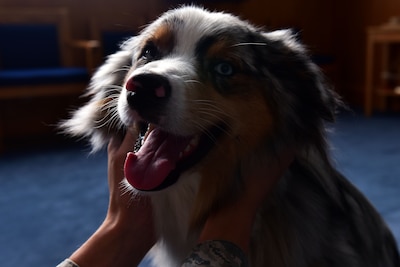By Air Force Airman Rhett Isbell, 19th Airlift Wing
LITTLE ROCK AIR FORCE BASE, Ark., Sept. 29, 2017 — A staff
member pads down the chapel aisle as the sanctuary lies still. He’s tired, but
cheerful, after getting up early to support the combat airlift mission here.
Milo, the 19th Airlift Wing’s morale dog, shakes a sense of
wakefulness into his stride and readies himself to begin his work day. With the
guidance of his handler and after extensive training, Milo helps the chapel
staff care for airmen here.
“We had some airmen helping us with something and when I
looked around I saw an airman tearing up as he pet him,” said Air Force Staff
Sgt. Kolton Rottinghaus, the noncommissioned officer in charge of plans and
programs at 19th Airlift Wing. “I’m sure that airman shared some thoughts with
him, which no one else had been allowed to hear until then. There are times
when people are going through their own personal issues, and while I may not be
able to support them too much, he’s able to connect with them almost
instantly.”
Epiphany
“As chapel staff, we’re charged with taking care of airmen
-- not just the spiritual side, but the mental and social sides as well,”
Rottinghaus said. “I was at home thinking of ways to do just that, while I was
playing with Milo and I realized something: I’m having fun right now. I’m
having fun and I know tons of people that would have fun doing this too.”
After his epiphany, Rottinghaus knew a morale dog was
missing from the base chapel staff and that he’d have to jump through a few
hoops himself to get one. The process involved having to send Milo away for
three and a half months for obedience training, and Rottinghaus went to
Louisiana for a week of handler training. Afterward, he started pushing to
bring the morale dog program to the base.
“It’s a creative way to provide that bridge between members
of the chapel and the airmen we’re trying to help,” said Chaplain (Lt. Col.)
David Knight, the 19th Airlift Wing chaplain. “Our role is providing for the
spiritual fitness of Team Little Rock, and Milo really helps people open up and
tell us how we can best do that.”
Milo has shown himself to be a key member of the team, one
that is able to reach airmen who may be emotionally inaccessible to the chapel
staff.
“He can help you connect with pretty much anybody,”
Rottinghaus said. “He’ll put his paws on someone’s lap and open himself up to
appreciation or attention from individuals he senses may be having a hard
time.”
Milo serves as a resiliency tool for the chapel staff and a
friend to the other members of Team Little Rock, performing feats his fellow
team members are incapable of.
“There’re times when no words will suffice to help bring
someone into the state of mind that they can open up to you,” Rottinghaus said.
“Milo helps break that barrier with a wag of his tail or a lick of the hand.
He’s a lifesaver.”









No comments:
Post a Comment